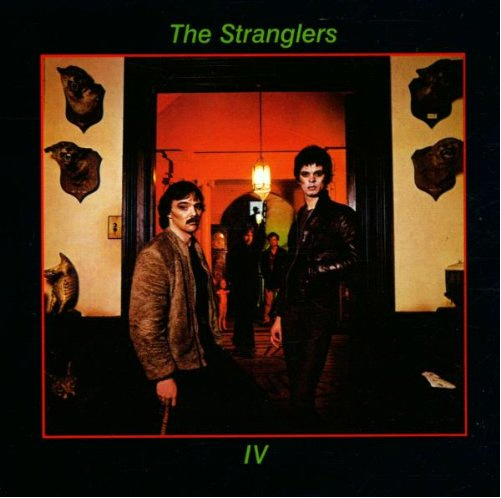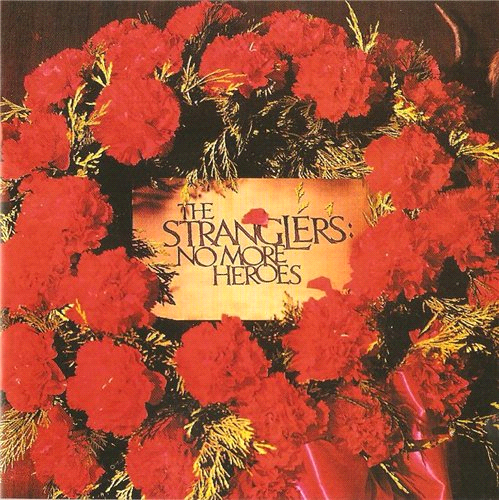Going on The Stranglers
Album By Album
Career Retrospective
Part One
By Andrew Barclay
The Stranglers have long been one of the UK’s most respected bands, playing high octane punk rock in the late 70s, before dipping their toes into the New Wave, then settling into radio friendly pop in Hugh Cornwell’s latter period with the band.
Most groups call it a day when such charismatic leaders leave, The Stranglers kept on going, with a truly enigmatic replacement in the form of Paul Roberts, and then on his departure, changing the vocal duties yet again. In the first few parts of the Album By Album career retrospective I’m going to concentrate on the Hugh Cornwell years, yielding what many still say is the golden era of The Stranglers musical output.
This is purely a look at the bands studio albums, and not a peek into the band members private lives. If you're a Stranglers fan, I hope you enjoy reading this look back as much I did writing it
Rattus Norvegicus 1977
The Stranglers announced their arrival during a time of great musical upheaval, the punk era was well and truly the order of the day, and whilst The Stranglers did have the attitude, and in some cases the sound, they never did quite fit that genre. The swirling organ, which quickly became the bands signature sound, certainly wasn't the standard instruments of choice for your average punk outfit, but then again The Stranglers were never ones to follow any musical trend if the truth be told.
'Rattus Norvegicus' (the album was subject to a few name changes before settling on 'Rattus Norvegicus', 'IV' was considered as shown above, as was 'Dead On Arrival') was a solid, inspiring album, of material that ranged from the brilliant, to the run of the mill, though thankfully, it was mostly brilliant. 'Sometimes' kicks the album off, and also sparked the misogynistic accusations the band still get leveled at them even today. Easy to see with lyrics as straight to the point as "Sometimes I wanna smack you're face". Dave Greenfields leading organ riff immediately draws comparisons to the American 60s band The Doors, but The Doors didn't have a bass player, and wow, did The Stranglers how some bass player. 'Sometimes' is driven by JJ Burnel’s grinding bass work, his rhythm carrying the song as it burns itself into you're memory forever.
All the same components are in play for the second song 'Goodbye Toulouse', which although contains a memorable melody by Cornwell, seems to lack the punch of the opener. 'London Lady' written by Burnel, is a little less on par with The Stranglers better moments on this record, although it did remain in the bands live set for many years to come. It was upbeat for sure, but overall, perhaps one of the least appealing moments on the record, even if it does contain a scrappy lead guitar break by classically trained guitarist Hugh Cornwell.
'Princess of the Streets' saw The Stranglers really sound like The Doors more than ever, with that lazy organ filled Blues sound that the comparison band excelled so much at in the last two years of their career. Cornwell again provides some stinging guitar work, but somehow the magic isn't quite there.
Then like a bolt out of the blue, they burst into 'Hanging Around' an instant Stranglers classic, with marvelous vocals by Cornwall. Quite why it wasn't released as a single in the UK baffles me as it really is one of the bands most accessible moments.
The crowning moment of the album plays next, 'Peaches', with its near legendary twin bass/organ riff providing Cornwall with the perfect backdrop to slur and wrap his phrasing all over the somewhat crude lyrics, which I’m pleased to add don't deter from the genius one little bit. 'Peaches' was quite rightly one of the songs selected as a single. TV Chef Keith Floyd liked it so much that it served as a rather unlikely theme tune for his cooking show a few years later.
'(Get A) Grip (On Yourself)' was the albums other single release, and a fine one at that, showcasing that seemingly effortless swagger carried off by some first class bass work and keyboard playing. The tellingly down to earth lyrics 'but the money's no good, get a grip on yourself' as well as being quite funny, is sound advice to any young tikes looking at starting a band.
Most any song trying to follow up the three previous tracks would have big shoes to fill, so it comes as no surprise that 'Ugly' was a little off the mark. Whereas 'Peaches' was genuinely funny, 'Ugly', a tale of acne and farts, misses the mark by quite some distance. Possibly the nearest the band could claim to actual punk though it must be said.
Before you know where you are, the album is about to close, and its fitting then that it one of the bands most durable moments that they choose to end their debut with. 'Down in the Sewer', sung in a cocky sneer by Hugh Cornwall is strictly tongue in cheek, and relates the story of, well living in the sewer with the rats. As a subject matter, the band get quite some considerable mileage out of it, and with the tempo shifts, and perfect musicianship, it’s a closer worth waiting for.
The reissue on CD of the bands debut album contained three bonus tracks. The first of which wouldn't have been new to staunch fans who went to the pub gigs from the mid 70s, 'Choosey Susie' was a pleasant enough ditty, crude as ever, but lacking that spark that made the albums best moments really shine. 'Go Buddy Go' had the rock'n'roll flavour of T-Rex, but again was unremarkable if I’m honest. It was added as the B-Side of 'Peaches' which probably explains why is was quite popular with live audiences at the time, with most of them no doubt having bought the single.
Wrapping the CD reissue up is a live version of a song that didn't actually appear until the bands follow up album, its 'Peasant in the Big Shitty', and frustratingly wasn't one of that albums better moments, and nor is it one of the highlights here. 'Rattus Norvegicus' plays much better when you stick with the original track listing, and as much as extra tracks are mostly welcome, here they only serve to derail what was a very well sequenced album the first time around.
4/5
No More Heroes 1977
Its quite rare that a follow up album eclipses a bands debut, this is usually because many bands spend years gigging and ironing out the material they place on the first album, so that by the time they reach the second album, they either run out of steam, or find that the light has dimmed a little. Nothing of the sort can be said of The Stranglers second longer player, the magnificent 'No More Heroes'.
If punk as a movement was ever shocking, it was in the rare moments that some of the bands let loose with genuine political statements, and perhaps the best of these, although again i must add The Stranglers aren't punks in the strictest sense, was the scathing 'I Feel Like A Wog', tackling head on a taboo subject that is still to this day a somewhat contentious issue in music, racism. The use of the term 'wog' is absolutely justified here, and not only is the sentiments of the song commendable, but its a barn storming track to boot. Again, repeating a winning formula, the musical landscape is of the same ilk as the debut album, but in my humble opinion, 'No More Heroes' is leaps and bounds ahead of its predecessor.
‘Bitching’ sees a basic chord structure established and then Burnels bass work transforms the song into a more engaging song altogether. Basically a moan about people who do nothing but moan, it certainly makes its point, with backing vocals that are almost delivered in a Doo Wop style. All in all Its possibly one of the weaker tracks on the album, but it still gets a live airing now and then.
‘Dead Ringer’ follows, and from the first few bass notes, the song makes an instant impact. It’s a classic Stranglers moment and the shouted chorus plays to the songs rowdy sing-along appeal. ‘Dagenham Dave’ bursts into action, a playful tale and all things considered, not a bad track at all. Its main strengths are its chorus, again, like ‘Dead Ringer’, its an easy number to get lodged into your mind, The Stranglers were always able to imprint lyrics that way, whatever the songs subject matter was.
‘Bring On The Nubiles’ is actually a classic, and one of my favorite early period songs. In terms of objectifying women its up there with the best of them, although that’s not what makes this song great, it’s the overall punchy arrangements, although lyrics as simple as “let me let me let me fuck ya” do have a certain childish appeal. I think it was one of Cornwells favorites too, with it cropping up often in live sets.
‘Something Better Change’ is another early gem, and became a firm fan favorite. Always appearing on compilation albums, its charm is apparent from the get go. It’s a chanting number, and sang in a very punky delivery. The Stranglers were most definitely playing up to the punk image that seemed to be wrongly attached to them.
Next, yet another future classic is unveiled, ‘No More Heroes’ is pure bliss. The keyboards spiral over the track, and yet again, Burnels bass dominates the song. The song regularly appears in the bands live set, throughout all the bands line up changes, and that speaks volumes about the songs longevity. ‘Pleasent In The Big Shitty’ is next, and as mentioned earlier, its not one of the albums highlights to be fair. It sound a little like something The Damned might do, not that The Damned arent a fine band, but it just seems a bit at odds with the laddish music the band were putting out at the time, adopting a more horror kind of angle.
‘Burning Up Time’ is another good example of the punky basic tracks with sprinkles of keyboards layered over, and if not really in league with best this album has to offer, it rumbles along pleasantly enough. Another track its hard to get too over enthusiastic about is ‘English Towns’. Its a reasonable entry, but when compared to the better material doesn’t hold up well. Good news then the one of the those better songs is next, with the seven minute plus ‘School Mam’ closing the album. Covering the fairly disturbing subject of child abuse, its excellently realized both lyrically and musically. Cornwell sounds invested in the message, and the bass work is classic Burnel. It builds into a crescendo with Cornwell moaning in erotic pleasure which adds to the impact of it all.
The albums bonus tracks are actually very strong, with ‘Straighten Out’, ‘Rok It To The Moon’ and ‘5 Minutes’ all being better than some of the songs that did make it onto the original pressings of the album. Particularly ‘5 Minutes’ which was strong enough to have been up there with the best moments of the album had the band elected to include it.
5/5
| Print article | This entry was posted by Cool Manchester on 18/02/12 at 06:19:00 pm . Follow any responses to this post through RSS 2.0. |










